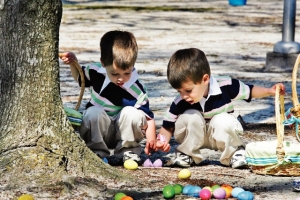Two and three of a kind share identical bonds
By Nick Hiltunen
Published in News on April 5, 2009 2:00 AM

News-Argus/MITCH LOEBER
Three-year-old Isaac Strickland, left, and his twin, Jack, hunt for Easter eggs at Herman Park during a multiples egg hunt in the park Saturday.
When she found out she was having identical twin girls, Tracy Everette-Lenz knew there would be additional risk factors in connection with the birth.
That's one reason the Wilson County school psychologist has reached out to an area group that supports people who have twins, triplets and other multiple bundles of joy.
She and Comanda Robinson of the Pikeville area were two prospective members of the Goldsboro Parents of Multiples group, which met on Saturday in support of Multiple Birth Awareness Month.
The group had an Easter egg hunt, along with other activities at Herman Park on Monday morning. Mrs. Robinson and Mrs. Everette-Lenz wanted to see what the organization had to offer, watching the group and speaking with members.
Mrs. Everette-Lenz said any mother expecting more than one baby at once probably has some reservations.
"I think you would have to be a little bit insane not to be a little nervous -- double the responsibility. The physical, the emotional, the financial issues that you have to incorporate when you're dealing with twins," she said.
There are other potential complications, which is the focus of the "awareness month," held every April and sponsored by the National Organization of Mothers of Twins Clubs, the Fetal Hope Foundation and TWINS magazine.
Literature distributed in coordination with the awareness month focuses on higher risks of low birth weight, preterm birth, long-term morbidity and early death of multiples.
The national organization also notes that the rate of parents having multiples has doubled since the 1980s.
The club's current president said the rate has increased partly because of new fertility techniques being used, and also because couples are waiting longer to have their first child.
"Having multiples is more common if you give birth later in life," said Jill Stevens, the current president of Goldsboro Parents of Multiples.
But regardless of the reason for having twins, triplets, quadruplets or more, the organization is about helping mothers understand what they're facing, Mrs. Stevens said.
Ms. Everette-Lenz has a 3-1/2 year old son, which may help her answer some questions about parenting before she gives birth to her twin girls, she said.
But although Mrs. Robinson also has a young son, 2-year-old A.J., who sat close to his mother, the mother-of-multiples to be has worries.
The doctors have told her that she will give birth to triplets -- one boy and two girls.
If Mrs. Robinson chooses to join the group, that will make the second pair of triplets among about 12 member families. The rest have twins.
The organization's founder, Jennifer Strickland, said that the similarities between many of the children in the group seems to help everyone involved.
"Right now, everyone in the club has children about the same age, from age 3 to age 5. We're all going through potty training at the same time, we're all going through sleep training at the same time," Mrs. Strickland said.
Having other ears to bend about parenting issues lets members feel free to air their questions, the organization founder said.
"(They ask), 'How do you get them to sleep through the night, how do you get them out of your bed?' With two or more children, those issues ... it gets very difficult."
That difficulty is not lost on Mrs. Robinson, the mother expecting twin girls and boy.
"Basically, everybody said it was about a schedule. With three kids, how do you know how to schedule them? How do you put triplets on a schedule? Because when babies have needs, they have needs right now."
Those questions may be answered by spending some time with other members of the club, said Mrs. Stevens, the club president.
With one of her twins, 4-year-old Gavin, at her side, Mrs. Stevens explained benefits given by both local membership and affiliation with state and national clubs.
"It's just more networking, with the national group. They have more resources, and the club (benefits) from being affiliated with them," the club president said.
